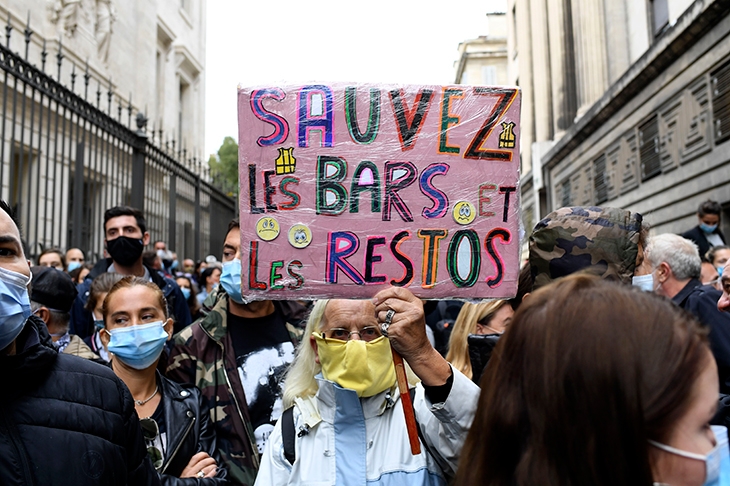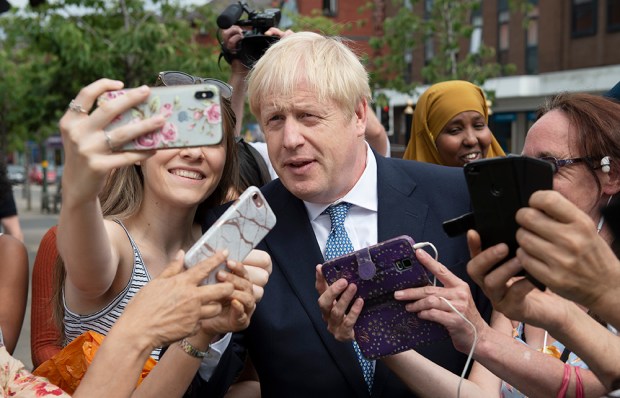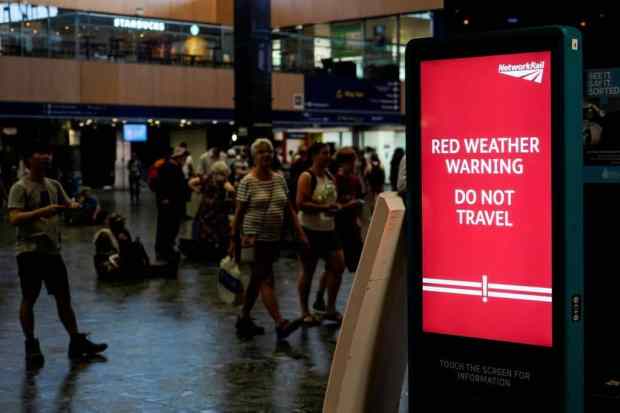From the vantage point of Downing Street, Boris Johnson may feel reassured that the further measures against Covid-19 he imposed this week, along with the extraordinary fines with which he has decided to enforce restrictions across the country, appear to have public support. Indeed, one poll suggested that upwards of 60 per cent of the population believe the government did not go far enough last week when it ordered pubs to close at 10 p.m.
But the Prime Minister should not be fooled by that apparent backing. Before he commits himself to any further action he needs to look to Marseilles, where President Emmanuel Macron has come unstuck after trying to impose similar measures. Having previously said that he would not respond to a second Covid-19 wave with a lockdown, Macron nevertheless issued an order for the bars and restaurants in France’s second–largest city to close for a fortnight.
In France, as in Britain, the initial lockdown in March was met with little opposition: nothing was known about Covid-19 and Imperial College London drew up a scenario showing the virus was capable of causing 730,000 deaths in France alone. In the event, 30,000 died during the first wave, peaking at 1,440 deaths a day. The second wave looks nowhere near as bad as the first, with deaths now running at around 90 a day. As a result, Macron is facing protests from those who argue that Covid is a manageable risk that does not justify the lockdown measures ordered the first time.
In Marseilles, hundreds of owners of bars and restaurants have taken to the streets in protest, asking for evidence to justify the closure order. The city’s mayor, Michèle Rubirola, complained that the city had not even been consulted. There is no doubt that the virus has returned: a third of intensive care beds in the city’s hospitals are occupied by Covid patients. But harder questions are being asked about the proportionality of the response. If lockdown is to stop intensive care units overflowing, city authorities have asked, then why not expand the hospitals?
All restrictions have harmful side effects. It looks as if the disruption associated with Britain’s response to Covid, for example, will claim more lives than the virus itself, in delayed operations, missed cancer screenings, lockdown-induced recession and bankruptcies just to begin with. This may be a price worth paying, lockdown having prevented even more deaths — the ones that would have happened had the virus not been checked — but nonetheless, the cost exists and the government must consider it.
As in Marseilles, so it is in Madrid, where the city’s leader, Isabel Díaz Ayuso, has rejected the national government’s attempt to return the capital to lockdown, arguing that ‘people get run over every day, but we don’t ban cars’. Such trade-offs between liberty and security are made in every area of public life. As Simon Wood argues in his article, it’s time for such calculations to apply to managing Covid, as we learn to live with the virus rather than seek to eradicate it. Were we to have a million more unemployed (a conservative estimate if restrictions continue for long), the balance between Covid and the economy will begin to look very different, and the ‘lives vs livelihoods’ argument loses its force.
The public mood is changing in Spain, France and elsewhere. Government ministers are coming under pressure to explain themselves more fully, rather than deploy emergency powers. At first, lockdown measures were widely accepted as an urgent step to tackle a threat which few at the time understood. But these restrictions, unprecedented in peacetime and tighter in many ways than any imposed in Britain during the second world war, were accepted as a short-term measure while we learned more about the problem.
In Britain, we were initially told they would be in place for three weeks. Given that the incubation period of the virus was put at two weeks, it seemed a clear and reasoned strategy: the epidemic could be suppressed through a one-off suspension of everyday life. Six months on, it is less clear what the strategy is.
In No. 10’s defence, it remains unclear where the virus is heading. The Prime Minister can hardly ignore the scenario drawn up by Sir Patrick Vallance, his chief scientific officer, pointing to new cases surging to 50,000 a day. Nor can he ignore the fact that this scenario is unlikely to come to pass: cases are rising but remain far below the Vallance trajectory. Neither France nor Spain, both judged to be about three weeks ahead of Britain in the second wave, are seeing anything like the growth seen the first time.
If ministers can no longer persuade people to obey restrictions, they can of course rely on the police, but to have officers forcing their way into private homes to disrupt meetings between friends risks further alienation of public support. Police in Glasgow announced that they have broken up at least 300 gatherings inside people’s houses, from dinner parties to student parties. It is not difficult to understand why the public will begin to resent these sorts of measures.
In Britain, as in Marseilles, increasing numbers are asking: where is the scientific evidence for the measures being imposed upon us? The government has failed to explain where the ‘rule of six’ or the 10 p.m. pub and restaurant curfew came from. It is either going to have to come up with a clearer Covid strategy and a better quality of argument to justify what it is doing, or watch as the polls crumble and the public demand a change in direction.
Got something to add? Join the discussion and comment below.
Get 10 issues for just $10
Subscribe to The Spectator Australia today for the next 10 magazine issues, plus full online access, for just $10.
You might disagree with half of it, but you’ll enjoy reading all of it. Try your first month for free, then just $2 a week for the remainder of your first year.














Comments
Don't miss out
Join the conversation with other Spectator Australia readers. Subscribe to leave a comment.
SUBSCRIBEAlready a subscriber? Log in